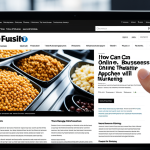Immediate Strategies for Driving Innovation in Economic Uncertainty
Navigating economic uncertainty demands that UK business services pivot quickly to sustain innovation in business services. Prioritising agility is crucial; firms must embrace flexible approaches, enabling rapid response to market shifts without excessive resource drain.
Quick wins often stem from resourcefulness—leveraging existing assets smarter rather than seeking costly overhauls. For example, enhancing customer feedback loops and streamlining internal processes can spark innovation without heavy investment. UK business adaptation thrives when leaders encourage cross-functional collaboration, fostering creative problem-solving amid constraints.
Additional reading : What are the best practices for UK business services to ensure data security?
A practical tactic involves focusing on incremental improvements that build resilience, such as adopting modular service delivery models or using digital tools to automate routine tasks. These strategies enable firms to maintain momentum despite financial pressures.
In summary, companies that emphasise agility and resourcefulness stand the best chance to innovate during downturns. By integrating these immediate strategies, UK business services can not only weather economic uncertainty but also position themselves for growth as conditions stabilize.
Topic to read : How Can UK Businesses Elevate Their Client Services?
Immediate Strategies for Driving Innovation in Economic Uncertainty
Economic uncertainty demands UK business adaptation that places innovation in business services at the forefront. A vital practical tactic is implementing modular service delivery to enhance scalability and flexibility—this adapts quickly to fluctuating customer needs without large upfront costs. Focusing on quick wins like automating routine tasks with affordable digital tools boosts efficiency and frees resources to develop innovative offerings.
Prioritising agility means embedding continuous learning into company culture, encouraging teams to experiment within controlled parameters and rapidly iterate based on feedback. Resourcefulness becomes apparent when firms repurpose existing competencies or technologies to enter adjacent markets or meet evolving demands.
For example, UK business services can create cross-department innovation hubs that capture diverse insights, accelerating problem-solving in unsettled markets. This approach leverages collective expertise while maintaining a nimble response to challenges. Maintaining transparent communication further fuels adaptability, aligning goals amidst changing economic conditions.
By harnessing these immediate strategies—modular delivery, task automation, cross-functional teams—businesses strengthen resilience and sustain innovation, even under economic pressure.
Immediate Strategies for Driving Innovation in Economic Uncertainty
When confronting economic uncertainty, UK business adaptation must centre on sustained innovation in business services through practical, actionable steps. Firms can prioritise agility by embedding continuous improvement cycles that rapidly adjust offerings to evolving market demands. This means using data-driven insights to identify pain points quickly and reallocating resources to pilot solutions with minimal risk.
A key practical tactic includes upskilling employees to enhance organisational flexibility, enabling teams to apply new technologies adeptly and foster resourcefulness. Quick wins often arise from digital automation of repetitive processes, reducing costs and freeing time for creative initiatives. For instance, automating client onboarding or billing can improve efficiency without heavy investment, supporting ongoing innovation.
Additionally, cross-department collaboration accelerates problem-solving during turbulence. By forming multifunctional teams dedicated to innovation projects, UK business services leverage diverse perspectives to iterate ideas swiftly. This approach encourages experimentation within controlled boundaries, decreasing resistance to change and enhancing responsiveness amid uncertainty. Prioritising these immediate strategies empowers firms to remain competitive and innovative despite economic challenges.
Immediate Strategies for Driving Innovation in Economic Uncertainty
In times of economic uncertainty, UK business adaptation must focus sharply on practical tactics that sustain innovation in business services without stretching limited resources. Prioritising agility means implementing rapid decision-making frameworks that allow firms to adjust course as market conditions shift. This responsiveness ensures innovations remain relevant and timely.
One effective quick win is leveraging low-cost digital automation to handle repetitive tasks, which simultaneously improves efficiency and frees employee time for creative problem-solving. Enhancing internal communication channels also fosters resourcefulness by enabling teams to share insights swiftly and collaborate effectively across departments.
Furthermore, continuous upskilling equips employees with adaptable skills to manage emerging technologies and evolving client needs confidently. When firms embed these tactics—rapid iteration, task automation, and skill development—they create an innovative culture resilient to economic shocks. This approach empowers UK business services to maintain momentum, turn challenges into opportunities, and drive sustained innovation despite ongoing uncertainty.
Immediate Strategies for Driving Innovation in Economic Uncertainty
Sustaining innovation in business services during economic uncertainty requires sharp focus on practical tactics that enable swift UK business adaptation. One impactful approach is embedding shorter innovation cycles that allow rapid testing and refining of ideas, reducing risk while maintaining momentum. This addresses challenges posed by unpredictable market forces and fluid customer needs.
Quick wins often emerge from optimising existing assets and streamlining processes through affordable digital automation, freeing time for inventive problem-solving. For instance, integrating AI-powered tools for data analysis helps firms identify new service opportunities or inefficiencies rapidly without extensive upfront investment.
Prioritising agility also means cultivating a culture tolerant of experimentation, where teams can pivot quickly based on real-time feedback. Encouraging cross-functional collaboration ensures resourcefulness by tapping diverse expertise, crucial for overcoming uncertainties in the UK business landscape.
In summary, firms that integrate rapid iteration, resource optimisation, and teamwork position themselves to innovate continuously despite economic turbulence. These immediate strategies empower UK businesses to adapt effectively and unlock growth potential during challenging times.






